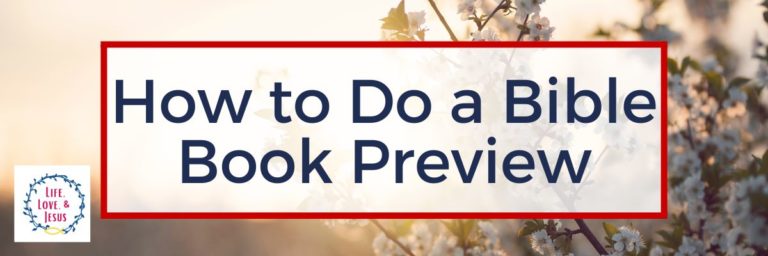An Easy But Powerful Bible Study Method for Beginners
This post contains affiliate links. If you click & make a purchase, I receive a commission! Thanks! Read my full disclosure policy. As an Amazon Associate, I earn from qualifying purchases.
This easy but powerful Bible study method for beginners will give you the tools you need to get into God’s Word and get God’s Word into you. The 6P Bible Study Method is more of a framework for studying, no matter what method you use, than a prescribed way to study.
If you’re doing a topical study, The 6P Bible Study Method will aid you. If you’re working through a published study, it will help. If you’re making your way through a book study or character study or word study – it’ll help. Not because it will make your study easier or provide you with the perfect worksheets. Instead, The 6P Bible Study Method will help you by keeping you focused on what really matters in any Bible study: knowing the God of the Word, not just knowing the Word.

Each part of this process will keep you focused on that one main goal: knowing the Word better so you will know God better.
The Parts of the 6P Bible Study Method

- Prayer
- Plan
- Put on
- Prepare
- Praise
Prayer
Before you read or study the Bible, you should always pray. Prayer prepares your heart to receive what the Spirit teaches you. The Bible is God’s Word for us. He intends for us to understand it – but the Bible is also clear that no one can understand the Word of God without the Spirit of God (John 14:26; 1 Corinthians 2:11).
Perhaps you’ve wondered how sincere believers could have used the Bible in the past to justify slavery or domestic abuse or slaughtering Jews or any other atrocities. Aside from the reality that many of those who did and justified such things were most likely not true believers, we must recognize that self-deception is a common human trait.
Don’t assume you’d never deceive yourself – that your judgment and understanding can be trusted (unlike those misguided people from the past). You cannot trust your wisdom, intellect, or education to lead you to the truth because your heart is deceitful and desperately wicked (Jeremiah 17:9). The Word is clear that human wisdom is foolishness compared to godly wisdom (1 Corinthians 1:27; James 1:5; 3:13-18). Knowing this truth, you must always take the time to pray before opening the Word.
If you have no idea what to pray, begin with Scripture. Psalm 119:18 is a perfect prayer to use, “Open my eyes, that I may behold wondrous things out of your law.”
I love this verse for a few reasons. First, I know it’s a prayer the Lord will always answer. Second, this verse reassures me that, no matter how many times I may have read a certain passage of Scripture, the Lord can still reveal “wonderous things” to me.
Maybe you’ve had the same experience I’ve had many times. You read a passage of Scripture that you’ve read before – maybe even one you’ve studied deeply. It’s a passage you’re very familiar with and you think you’ve gotten all the precious truth out of it.
Then WOW!
You open up to the same passage one day and it’s like the Holy Spirit shines a neon spotlight on something you’ve never seen before. It may be one verse, phrase, or even just one word. And you think to yourself, “How did I miss that?!?” You can’t believe you’ve never seen it before! But there, right in front of your eyes, is a truth that brings delight, joy, wisdom, peace, and hope.
That is the Holy Spirit, meeting you just where you need Him because you took the time to pray.
What to pray for
Aside from Praying Psalm 119:18, spend a few moments praying for
- Open ears to hear the Spirit
- Open eyes to see spiritual truth
- An open heart to accept spiritual truth even when it’s hard
- Wisdom to discern your thoughts from God’s
- Wisdom about how to live out what the Lord teaches you
- A wholehearted willingness to obey whatever He teaches and asks
Plan for Bible Study

I’m sure you remember going to school. As a child or teenager, you were given little choice. Someone in your life, probably your parents, decided you needed an education, so you went to school.
Later, as a high school graduate, maybe you headed to college or trade school. Or maybe you went back to school as an older adult. What’s most likely true is that at some point in your life, you went to school – and probably for many years!
What was the purpose of going to school? To learn, of course! But did you just show up one day in Biology 101 at the age of 15 and expect to be fine learning everything? Of course not! You needed to prepare.
- You prepared for high school biology by learning to read, mastering elementary science facts and processes, and showing up to class on time.
- You prepared for college by going to high school.
- You prepared for kindergarten by learning to dress yourself.
- You prepared for college courses by registering, buying books, and organizing your notebooks, calendar, computer, and pens.
- Your parents helped you prepare for most of your elementary school years by providing you with crayons, pencils, and glue.
You get the idea: whatever you were going to learn in school, you first had to be prepared to learn. Never in your life have you learned anything without some preparation. Even learning to talk happened after you prepared by listening to a lot of talking!
Learning from the Bible is similar – you must prepare to learn. Part of that preparation is prayer, which we’ve already discussed.
But another part is the organization. Just to be obvious, it’s hard to study the Bible without a Bible! But a few other organizational questions need to be answered as well.
- Where will you do your Bible study? In your bedroom? At the kitchen table? In a home office? At the library? In your favorite chair?
- When will you study the Bible? First thing in the morning, setting the alarm earlier than you ever thought you would? Last thing before bed when the house and kids are finally quiet and the TV is off? After dropping all the kids at school and before starting on housework, home business, or personal activities?
- What will you study? A printed guide? A psalm or two? A gospel? The life of Mary, Jesus’ mother? What the Bible teaches about giving?
- What tools will you need? A Bible (obviously!). Online access to Bible study tools? Printouts from a downloaded workbook? A purchased Bible study guide? Pens, pencils, highlighters, and colored pencils? Index cards? A journal? A notebook?
- How much time will you dedicate to Bible study? Bible study of the kind we are discussing is different from daily devotional time. I spend 20 – 30 minutes every morning in daily devotional time. But my Bible study time is usually longer and not as frequent. Perhaps you’ll want to study three days a week for an hour each time. Maybe you’ll only get two hours every Sunday afternoon. Get out your calendar and see where you can schedule Bible study time. Make it an appointment, like having dinner with your boss. Don’t bail on God! Make the commitment and keep it.
Getting organized before your Bible study time will help to make your limited time as fruitful as possible. You will be able to focus on what God is saying instead of wondering where you put your favorite purple pen.
Print What You Learn
In the 6P Bible Study Method, printing refers to what you record about what you study. You may choose to have a 3-ring binder for recording your notes, a clothbound journal, or a digital document. Whatever method you choose (and these are not the only 3 choices), you need to be intentional about recording your thoughts as you study.
You may also want to print out any digital items that might help your study (worksheets, maps, question pages). Record your answers directly on these papers or record your answers in your journal or notebook. Maybe you prefer a digital world, so you use a PDF file in a note app and record your answers with a stylus.
It doesn’t matter what tools you use to write, print, or record your thoughts. What matters is that you make a record of what you are learning.
Just a side note from this pen-and-paper lover: Writing thoughts out long-hand helps you to better remember and recall what you learn (according to lots of research). You may want to consider this fact when making your decision about where to write your notes and ideas.
What should you be printing or writing?

- Your initial thoughts
- Your questions
- Related verses or passages
- Confusing passages, phrases, or words
- Key verses or passages
- Places where the Holy Spirit shines a spotlight
- Your prayers before studying
- Your confession when prompted
- Ideas for future studies
- Anything you want to discuss with someone else
- Anything else that strikes your fancy!
You may find that you want a new journal every year, every quarter, or just whenever the old one is filled. Again – do what works for you. But – DON’T throw away your journals or notebooks when they are full. Keep them through the years and you will find that those journals become a precious testimony to both your growth in faith and the faithfulness of God
Your Bible study journals will become a record of what God has taught you, where He has taken you, and what He has done in and through you. They will be treasured by you. But they will also be treasured by your children and grandchildren and great-grandchildren.
Your journals will become “memorial stones” for your family (Joshua 4:5-7).
More posts on Bible Study:
- 8 Great Bible Study Questions (for choosing a Bible study)
- 7 Awesome Bible Study Tips for Beginners
- The Best Bible Study Tools to Own
- How to Do a Verse Analysis
Put On – or Live What You Learn
This step is where the proverbial rubber meets the road. Don’t just learn – but live what you learn!
The phrase “put on” is used repeatedly in the New Testament to indicate how believers are to live their faith in a hostile world.
- Romans 13:14 says, “But put on the Lord Jesus Christ, and make no provision for the flesh in regard to its lusts.” This is the bottom line for believers: we are to be like Jesus. As you study the Word, the Spirit will reveal places in your life that are not like Jesus. He will show you what you need to “put on.”
- It could be righteousness, holiness, or truth (Ephesians 4:24). Or maybe He’ll pinpoint a need for compassion, kindness, humility, gentleness, patience, love, forgiveness, unity, or thankfulness (Colossians 3:12-15).
- Maybe He’ll show you where you need to put on truth and forsake false beliefs. Jesus did not tell the woman at the well that her beliefs were fine since she (and her people) were sincere. No, He told her that only worship based on truth was acceptable (John 4:22-24).
- Or perhaps you need to gear up and get in the battle by putting on the “full armor of God” (Ephesians 6:10-18). This world isn’t your home. You have an enemy who wants to make you stumble and fail in your faith walk. Putting on Jesus is the only way to victory. Day by day, verse by verse, reading, studying and applying the Word to your life is how you “put on the Lord Jesus Christ.”
I could keep going – but I’m sure you get the idea. You should never read or study the Word without letting its truths change your heart and life (James 1:21-25). Putting on means taking action. Start by asking yourself questions.
Questions to Ask Yourself About the Scriptures

- Is there a sin I need to confess?
- Is there a person I need to forgive?
- Is there a relationship I need to repair?
- Is there an enemy I need to pray for?
- Is there an attitude I need to change?
- Is there an idol I need to forsake?
- Is there a promise I need to claim?
- Is there a sacrifice I need to make?
- Is there somewhere special I need to go?
- Is there a change in my media & social media habits I need to make?
- Is there a habit I need to break?
As you plan for action, record your thoughts, actions, and results in your journal. Ask and answer questions such as
- What do you believe you need to do?
- What verse or passage prompted you to take that action?
- When will you keep that promise to God?
- What happened when you obeyed God?
As you start putting on the truth, the Spirit will continually bring more and more to your mind. He will not overwhelm you, but He will not let you rest on “good enough” either. Commit in your prayer time (the 1st “P”) to obey whatever the Lord tells you to do.
Knowing Jesus and becoming more like Him is the reason you study the Word.
Prepare
Besides applying the lessons you learn to your own life, you should be intentional about sharing what you learn from the Word with others. I’m constantly amazed at how little conversation about faith takes place among saved-by-faith, Jesus-loving American Christians. If He is the center of your life – and He should be – then talking about Him should not be something you avoid.
Just a side note: I’m preaching to myself here! We all fail in this area from time to time. But pray about and work on talking more about Jesus and His Word than about the weather, football, or even your kids.
Sharing what you learn in your Bible study time doesn’t need to be a formal class. Just having a conversation over coffee – or playdough or popcorn, depending on the age of your conversation partner – can be enough. Be like the woman at the well in John 4 who told everyone she knew about everything she learned!
One more note on sharing. I’m all in favor of sharing what the Lord is teaching you and the experiences He is leading you through in any way that glorifies Him. This includes social media. But if Facebook and Instagram take the place of actually sharing with flesh-and-blood people in person, then ditch the social media for real relationships! Yes, it’s messier and riskier – but also well worth it.
How do you prepare? First, you pray, of course. Pray for opportunities, boldness, and timing. Pray for the people you want to share with by name. Pray for receptive ears and good conversations. Pray Jesus will be lifted up and you’ll be a good ambassador.
But also consider what you might say. Think about key verses or ideas. Share how you are applying these lessons to your life. Talk about how the Bible informs your views on the news or culture or your kids’ school.
Also, consider what not to say. Remember, you are not the Holy Spirit. Sharing with like-minded believers can be encouraging for both of you. But when you’re sharing with someone of a differing viewpoint, choose your words wisely. As Paul says in Ephesians 4:15, speak “the truth in love.” In other words, don’t say, “You need to hear this.” Instead, let your words be “fitly spoken” (Proverbs 25:11).
Praise
Finally, spend time at the end of every study session praising God.
- Praise God for the insights He gives you.
- Praise God for the changes He is making in your life.
- Praise God for the people whose lives you are impacting.
- Praise God for the commitment to begin and the strength to continue.
- Praise Him first, last, and middle.
I’m sure you can think of many more reasons to praise Him.
What Now?
I hope and pray that you will find this method or this framework, to be useful in becoming more intentional about studying and living the Word of God. An old joke asks, “How do you eat an elephant?” The answer, of course, is “one bite at a time.”
It’s that mentality that you need as you dig deep into the Word. Choose a small starting place to begin. Pray and plan – then follow your plan. Keep a written record of your adventures in Scripture and how it is changing your life (print and put on). Then prepare to share how the Holy Spirit is working in your life through the Word. Finally, praise God for revealing Himself in the Bible. What a precious gift!
You can do this. You can study the Word and let it change you. You can invite the Holy Spirit to teach and change you. You can look a bit more like Jesus – the Living Word – every day.
Where will you start?







